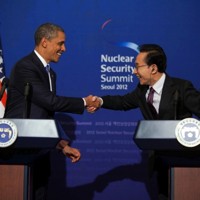The largest number of world leaders to visit South Korea in the country’s history are in Seoul for the March 26-27 Nuclear Security Summit. The delegations from the 54 countries and four international organizations that are participating include some 45 heads of state, with deputy prime ministers or foreign ministers representing the rest. The main objective of this week’s summit is to prevent nonstate actors, including terrorists and criminals, from acquiring dangerous nuclear materials, as the greatest obstacle to nuclear terrorism is not designing a weapon, concocting a plot or recruiting volunteers willing to suffer martyrdom -- it is acquiring the fissile nuclear material needed for a nuclear explosive device.
The Nuclear Security Summit focuses on averting this low-probability but high-risk danger, which has the potential to devastate the international economy and paralyze world trade. The summit’s specific goals are to promote a common understanding of the threat of nuclear terrorism, forge agreement on effective measures to secure dangerous nuclear material, protect nuclear facilities such as nuclear power plants from direct attack and support related initiatives to prevent the spread of nuclear materials and technologies.
U.S. President Barack Obama, who in his April 2009 Prague speech declared that he would eliminate or secure all dangerous nuclear material within four years, decided to organize the inaugural Nuclear Security Summit in April 2010 to support this goal. That first meeting focused on enhancing the security of unsecured fissile material stocks, such as those found in civilian nuclear power plants, which could be used to manufacture a nuclear bomb. At the time, other international institutions already existed to address the related issues of nuclear nonproliferation, nuclear disarmament and the peaceful use of nuclear energy. But efforts to improve the security of existing nuclear materials had consisted of ad hoc attempts to strengthen and integrate national laws, programs and regulations.

